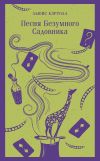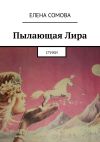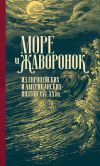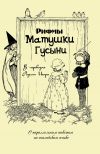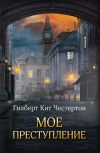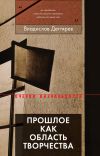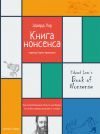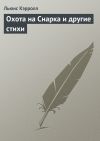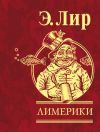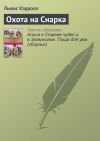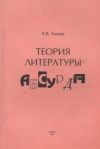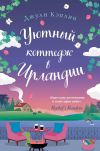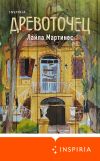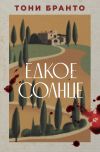Текст книги "Из полного собрания бессмыслиц"
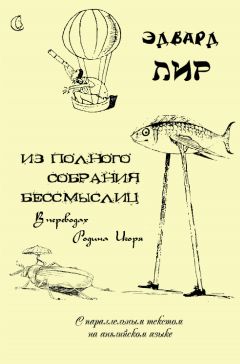
Автор книги: Эдвард Лир
Жанр: Зарубежные детские книги, Детские книги
сообщить о неприемлемом содержимом
Текущая страница: 2 (всего у книги 10 страниц) [доступный отрывок для чтения: 3 страниц]
The Pobble who has no toes
I
The Pobble who has no toes
Has once as many, as we;
When they said, “Some day you may lose
them all;” —
Hereplied, – “Fish fiddle de-dee!”
And his Aunt Jobiska made him drink,
Lavender water tinged with pink,
For she said, “The World in general knows
There’s nothing so good for a Pobble’s toes!”
II
The Pobble who has no toes,
Swam across the Bristol Channel;
But before he set out he wrapped his nose,
In a piece of scarlet flannel.
For his Aunt Jobiska said, “No harm
Can come to his toes if his nose is warm;
And it’s perfectly known that a Pobble’s toes
Are safe, – provided he minds his nose.»
III
The Pobble swam fast and well
And when boats or ships came near him
He tinkledy-binkledy-winkled a bell
So that all the world could hear him.
And all the Sailors and Admirals cried,
When they saw him nearing the further side,—
“He has gone to fish, for his Aunt Jobiska’s
Runcible Cat with crimson whiskers!”
IV
But before he touched the shore,
The shore of Bristol Channel,
A sea-green Porpoise carried away
His wrapper of scarlet flannel.
And when he came to observe his feet
Formely garnished with toes so neat
His face at once became forlorn
On perceiving that all his toes were gone!
V
And nobody ever knew
From that dark day to the present,
Whoso had taken the Pobble’s toes,
In a manner so far from pleasant.
Whether the shrimps or crawfish gray,
Or crafty Mermaids stole them away—
Nobody knew; and nobody knows
How the Pobble was robbed of his twice five toes!
VI
The Pobble who has no toes
Was placed in a friendly Bark,
And they rowed him back, and carried him up,
To his Aunt Jobiska’s Park.
And she made him a feast at his earnest wish
Of eggs and buttercups fried with fish;—
And she said, – “It’s a fact the whole world knows,
That Pobbles are happier without their toes.”
The courtship of the Yonghy-Bonghy-Bo
I
On the Coast of Coromandel,
Where the early pumpkins blow,
In the middle of the woods
Lived the Yonghy-Bonghy-Bo.
Two old chairs, and half a candle, —
One old jug without a handle, —
These were all his worldly goods:
In the niddle of the woods,
These were all the worldly goods
Of the Yonghy-Bonghy-Bo,
Of the Yonghy-Bonghy-Bo.
II
Once, among the Bong-trees walking,
Where the early pumpkins blow,
To a little heap of stones
Came the Yonghy-Bonghy-Bo.
There he heard a Lady talking,
To some milk-white Hens of Dorking, —
“’Tis the Lady Jingly Jones!
On that little heap of stones
Sits the Lady Jingly Jones!” —
Said the Yonghy-Bonghy-Bo,
Said the Yonghy-Bonghy-Bo.
III
“Lady Jingly! Lady Jingly!
Sitting where the pumpkins blow,
Will you come and be my wife?” —
Said the Yonghy-Bonghy-Bo.
“I’m tired of living singly, —
On this coast so wild and shingly, —
I’m a-weary of my life:
If you’ll come and be my wife,
Quite serene would be my life!” —
Said the Yonghy-Bonghy-Bo,
Said the Yonghy-Bonghy-Bo.
IV
“On this Coast of Coromandel,
Shrimps and watercresses grow,
Prawns are plentiful and cheap,”
Said the Yonghy-Bonghy-Bo.
“You shall have my chairs and candle,
And my jug without a handle! —
Gaze upon the rolling deep
(Fish is plentiful and cheap),
As the sea, my love is deep!” —
Said the Yonghy-Bonghy-Bo,
Said the Yonghy-Bonghy-Bo.
V
Lady Jingly answered sadly,
And her tears began to flow,—
“Your proposal comes too late,
Mr. Yonghy-Bonghy-Bo!
I would be your wife most gladly!”
(Here she twirled her fingers madly),
“But in England I’ve a mate!
Yes! you’ve asked me far too late,
For in England I’ve a mate,
Mr. Yonghy-Bonghy-Bo!
Mr. Yonghy-Bonghy-Bo!”
VI
“Mr. Jones (his name is Handel,—
Handel Jones, Esquire, & Co.)
Dorking fowls delights to send,
Mr. Yonghy-Bonghy-Bo!
Keep, oh! keep your chairs and candle,
And your jug without a handle,—
I can merely be your friend!
Should my Jones more Dorkings send,
I will give you three, my friend!
Mr. Yonghy-Bonghy-Bo!
Mr. Yonghy-Bonghy-Bo!”
VII
“Though you’ve such a tiny body,
And your head so large doth grow,—
Though your hat may blow away,
Mr. Yonghy-Bonghy-Bo!
Though you’re such a Hoddy Doddy,
Yet I wish that I could modi
fy the words I needs must say!
Will you please to go away?
That is all I have to say,
Mr. Yonghy-Bonghy-Bo!
Mr. Yonghy-Bonghy-Bo!”
VIII
Down the slippery slopes of Myrtle,
Where the early pumpkins blow,
To the calm and silent sea
Fled the Yonghy-Bonghy-Bo.
There, beyond the bay of Gurtle,
Lay a large and lively Turtle:
“You’re the Cove,” he said. “for me
On your back beyond the sea,
Turtle, you shall carry me!”
Said the Yonghy-Bonghy-Bo,
Said the Yonghy-Bonghy-Bo.
IX
Through the silent-roaring ocean
Did the Turtle swiftly go;
Holding fast upon his shell
Rode the Yonghy-Bonghy-Bo.
With a sad primжval motion
Towards the sunset isles of Boshen
Still the Turtle bore him well.
Holding fast upon his shell,
“Lady Jingly Jones, farewell!”—
Sang the Yonghy-Bonghy-Bo,
Sang the Yonghy-Bonghy-Bo.
X
From the Coast of Coromandel,
Did that Lady never go;
On that heap of stones she mourns
For the Yonghy-Bonghy-Bo.
On that Coast of Coromandel,
In his jug without a handle,
Still she weeps, and daily moans;
On that little heap of stones
To her Dorking Hens she moans,
For the Yonghy-Bonghy-Bo,
For the Yonghy-Bonghy-Bo.
The Jumblies
I
They went to sea in a Sieve, they did,
In a Sieve they went to sea:
In spite of all their friends could say,
On a winter’s morn, on a stormy day,
In a Sieve they went to sea!
And when the Sieve turned round and round,
And every one cried, “You’ll all be drowned!”
They called aloud, “Our Sieve ain’t big,
But we don’t care a buton! we don’ care a fig!
In a Sieve we’ll go to sea!”
Far and few, far and few,
Are the lands where the Jumblies live;
Their heads are green, and their hands are blue,
And they went to the sea in a Sieve.
II
They saled away in a Sieve, they did,
In a Sieve they sailed so fast,
With only a beautiful pea-green veil
Tied with a riband by way of a sail,
To a small tobacco-pipe mast;
And every one said, who saw them go,
“O won’t they be soon upset, you know!
For the sky is dark, and the voyage is long,
And happen what may, it’s extremely wrong
In a Sieve to sail so fast!”
Far and few, far and few,
Are the lands where the Jumblies live;
Their heads are green, and their hands are blue,
And they went to the sea in a Sieve.
III
The water it soon came in, it did,
The water it soon came in;
So to keep them dry, they wrapped their feet
In a pinky paper all folded neat,
And they fastened it down with a pin.
And they passed the night in a crockery-jar,
And each of them said, “How wise we are!
Though the sky be dark, and the voyage be long,
Yet we never can think we were rash or wrong,
While round in our Sieve we spin!”
Far and few, far and few,
Are the lands where the Jumblies live;
Their heads are green, and their hands are blue,
And they went to the sea in a Sieve.
IV
And all night long they sailed away;
And when the sun went down,
They whistled and warbled a moony song
To the echoing sound of a coppery gong,
In the shade of the mountains brown.
“O Timballo! How happy we are,
When we live in a sieve and a crockery-jar,
And all night long in the moonlight pale,
We sail away with a pea-green sail,
In the shade of the mountains brown!”
Far and few, far and few,
Are the lands where the Jumblies live;
Their heads are green, and their hands are blue,
And they went to the sea in a Sieve.
V
They sailed to the Western Sea, they did,
To a land all covered with trees,
And they bought an Owl, and a useful Cart,
And a pound of Rice, and a Cranberry Tart,
And a hive of silvery Bees.
And they bought a Pig, and some green Jack-daws,
And a lovely Monkey with lollipop paws,
And forty bottles of Ring-Bo-Ree,
And no end of Stilton Cheese.
Far and few, far and few,
Are the lands where the Jumblies live;
Their heads are green, and their hands are blue,
And they went to the sea in a Sieve.
VI
And in twenty years they all came back,
In twenty years or more,
And every one said, “How tall they’ve grown!
For they’ve been to the Lakes, and the Torrible
Zone,
And the hills of the Chankly Bore;
And they drank their health, and gave them a feast
Of dumplings made of beautiful yeast;
And every one said, “If we only live,
We too will go to sea in a Sieve, —
To the hills of the Chankly Bore!”
Far and few, far and few,
Are the lands where the Jumblies live;
Their heads are green, and their hands are blue,
And they went to the sea in a Sieve.

The Dong with a luminous Nose
When awful darkness and silence reign
Over the great Gromboolian plain,
Through the long, long wintry nights; —
When the angry breakers roar
As they beat on the rocky shore; —
When Storm-clouds brood on the towering
heights
Of the Hills of the Chankly Bore: —
Then, though the vast and gloomy dark,
There moves what seems a fiery spark,
A lonely spark with silvery rays
Piercing the coal-black night, —
A Meteor strange and bright:—
Hither and thither the vision strays,
A single lurid light.
Slowly it wanders, – pauses, – creeps, —
Anon it sparkles, – flashes and leaps;
And ever as onward it gleaming goes
A light on the Bong-tree stems it throws.
And those who watch at that midnight hour
From Hall or Terrace, or lofty Tower,
Cry, as the wild light passes along, —
“The Dong!—the Dong!
The wandering Dong through the forest goes!
The Dong! the Dong!
The Dong with a luminous Nose!”
Long years ago
The Dong was happy and gay,
Till he fell in love with a Jumbly Girl
Who came to those shores one day,
For the Jumblies came in a sieve, they did, —
Landing at eve near the Zemmery Fidd
Where the Oblong Oysters grow,
And the rocks are smooth and gray.
And all the woods and the valleys rang
With the Chorus they daily and nightly sang, —
Far and few, far and few,
Are the lands where the Jumblies live;
Their heads are green, and their hands are blue,
And they went to the sea in a Sieve.
Happily, happily passed those days!
While the cheerful Jumblies staid;
They danced in circlets all night long,
To the plaintive pipe of the lively Dong,
In moonlight, shine, or shade.
For day and night he was always there
By the side of the Jumbly Girl so fair,
With her sky-blue hands, and her sea-green hair.
Till the morning came of that hateful day
When the Jumblies sailed in their sieve away,
And the Dong was left on the cruel shore
Gazing – gazing for evermore, —
Ever keeping his weary eyes on
That pea-green sail on the far horizon, —
Singing the Jumbly Chorus still
As he sate all day on the grassy hill, —
Far and few, far and few,
Are the lands where the Jumblies live;
Their heads are green, and their hands are blue,
And they went to the sea in a Sieve.
But when the sun was low in the West,
The Dong arose and said,
“What little sense I once possessed
Has quite gone out of my head!” —
And since that day he wanders still
By lake and forest, marsh and hill,
Singing, “O somewhere, in valley or plain
Might I find my Jumbly Girl again!
For ever I’ll seek by lake and shore
Till I find my Jumbly Girl once more!”
Playing a pipe with silvery squeaks,
Since then his Jumbly Girl he seeks,
And because by night he could not see,
He gathered the bark of the Twangum Tree
On the flowery plain that grows.
And he wove him a wondrous Nose, —
A Nose as strange as a Nose could be!
Of vast proportions and painted red,
And tied with cords to the back of his head.
In a hollow rounded space it ended
With a luminous Lamp within suspended,
All fenced about
With a bandage stout
To prevent the wind from blowing it out;—
And with holes all round to send the light,
In gleaming rays on the dismal night.
And now each night, and all night long,
Over those plains still roams the Dong;
And above the wail of the Chimp and Snipe
You may hear the squeak of his plaintive pipe
While ever he seeks, but seeks in vain
To meet with his Jumbly Girl again;
Lonely and wild – all nights he goes, —
The Dong with a luminous Nose!
And all who watch at that midnight hour
From Hall or Terrace, or lofty Tower,
Cry, as they trace the Meteor bright,
Moving along through the dreary night,
“This is the hour when forth he goes,
The Dong with a luminous Nose!
Yonder—over the plain he goes;
He goes!
He goes;
The Dong with a luminous Nose!”

The Quangle Wangle’s Hat
I
On the top of the Crumpety Tree
The Quangle Wangle sat,
But his face you could not see,
On account of his Beaver Hat.
For his Hat was a hundred and two feet wide,
With ribbons and bibbons on every side
And bells, and buttons, and loops, and lace,
So that nobody ever could see the face
Of the Quangle Wangle Quee.
II
The Quangle Wangle said
To himself on the Crumpetty Tree,
“Jam; and jelly; and bread;
Are the best food for me!
But the longer I live on this Crumpetty Tree
The olainer than ever it seems to me
That very few people come this way
And that life on the whole is far from gay!”
Said the Quangle Wangle Quee.
III
But there came to the Crumpetty Tree,
Mr. and Mrs. Canary;
And they said, “Did you ever see
Any spot so charmingly airy?
May we build a nest on your lovely Hat?
Mr. Quangle Wangle, grant us that!
O please let us come and build a nest
Of whatever material suits you best,
Mr. Quangle Wangle Quee!”
IV
And besides, to the Crumpetty Tree
Came the Stork, the Duck, and the Owl;
The Snail, and the Bumble-Bee,
The Frog, and the Fimble Fowl;
(The Fimble Fowl, with a Corkscrew leg;)
And all of them said, “We humbly beg,
We may build our homes on your lovely Hat,
Mr. Quangle Wangle, grant us that!
Mr. Quangle Wangle Quee!”
V
And the Golden Grouse came there,
And the Pobble who has no toes,
And the small Olympian bear,
And the Dong with a luminous nose.
And the Blue Baboon, who played the flute,
And the Orient Calf from the Land of Tute,
And the Attery Squash, and the Bisky Bat,
All came and built on the lovely Hat
Of the Quangle Wangle Quee.
VI
And the Quangle Wangle said
To himself on the Crumpetty Tree,
“When all these creatures move
What a wonderful noise there’ll be!”
And at night by the light of the Mulberry moon
They danced to the Flute of the Blue Baboon,
On the broad green leaves of the Crumpetty Tree,
And all were as happy as happy could be,
With the Quangle Wangle Quee.
The Cummerbund
An Indian Poem
I
She sate upon her Dobie,
To watch the Evening Star,
And all the Punkahs as they passed,
Cried, “My! how fair you are!”
Around her bower, with quivering leaves,
The tall Kamsamahs grew,
And Kitmutgars in wild festoons
Hung down from Tchokis blue.
II
Below her home the river rolled
With soft meloobious sound,
Where golden-finned Chuprassies swam,
In myriads circling round.
Above, on talles trees remote
Green Ayahs perched alone,
And all night long the Mussak moan’d
Its melancholy tone.
III
And where the purple Nullahs threw
Their branches far and wide,—
And silvery Goreewallahs flew
In silence, side by side,—
The little Bheesties’ twittering cry
Rose on the fragrant air,
And oft the angry Jampan howled
Deep in his hateful lair.
IV
She sate upon her Dobie,
She heard the Nimmak hum,
When all at once a cry arose,
“The Cummerbund is come!”
In vain she fled: – with open jaws
The angry monster followed,
And so, (before assistence came,)
That Lady Fair was swallowed.
V
They sought in vain for even a bone
Respectfully to bury,—
They said, – “Hers was a dreadful fate!”
(And Echo answered “Very.”)
They nailed her Dobie to the wall,
Where last her form was seen,
And underneath they wrote these words,
In yellow, blue, and green:—
Beware, ye Fair! Ye Fair, beware!
Nor sit out late at night,—
Lest horrid Cummerbunds should come,
And swallow you outright.
Mr. and Mrs. Discobbolos
First PartI
Mr. and Mrs. Discobbolos
Climbed to the top of a wall.
And they sat to watch the sunset sky
And to hear the Nupiter Piffkin cry
And the Biscuit Buffalo call.
They took up a roll and some Camomile tea,
And both were as happy as happy could be—
Till Mrs. Discobbolos said,
“Oh! W! X! Y! Z!
It was just come into my head—
Suppose we should happen to fall!
Darling Mr. Discobbolos!
II
Suppose we should fall down flumpetty
Just like pieces of stone!
On to the thorns,—or into the moat!
What would become of your new green coat?
And might you not break a bone?
It never occurred to me before
That perhaps we shall never go down any more!”
And Mrs. Discobbolos said,
“Oh! W! X! Y! Z!
What put it into your head
To climb up this wall? – my own
Darling Mr. Discobbolos?”
III
Mr. Discobbolos answered,
“At first it gave me pain,—
And I felt my ears turn perfectly pink
When your exclamation made me think
We might never get down again!
But now I believe it is wiser far
To remain for ever just where we are.”
And Mr. Discobbolos said,
“Oh! W! X! Y! Z!
It has just come into my head —
We shall never go down again,
Dearest Mrs. Discobbolos!”
IV
Second part
So Mr. and Mrs. Discobbolos
Stood up, and began to sing,
“Far away from hurry and strife
Here we will pass the rest of life,
Ding a dong, ding dong, ding!
We want no knives nor forks nor chairs,
No tables nor carpets nor household cares,
From worry of life we’ve fled —
Oh! W! X! Y! Z!
There is no more trouble ahead,
Sorrow or any such thing—
For Mr. and Mrs. Discobbolos!”
I
Mr. and Mrs. Discobbolos
Lived on the top of the wall
For twenty years, a month and a day,—
Till their hair had grown all pearly grey,
And their teeth began to fall.
They never were ill, or at all dejected.
By all admired, and by some respected,
Till Mrs. Discobbolos said,
“Oh! W! X! Y! Z!
It has just come into my head,
We have had no more room at all—
Darling Mr. Discobbolos!
II
Look at our six fine boys!
And our six sweet girls so fair!
Upon this wall they have all been born,
And not one of the twelve has happened to fall
Through my maternal care!
Surely they should not pass their lives
Without any chance of husbands or wives!”
And Mrs. Discobbolos said,
“O, W! X! Y! Z!
Did it never come into your head
That our lives must be lived elsewhere,
Dearest Mr. Discobbolos?
III
They have never been at a ball,
Nor have even seen a bazaar!
Nor have heard folks say in a tone all hearty,
“What loves of girls (at a garden party)
Those Misses Discobbolos are!”
Morning and night it drives me wild
To think of the fate of each darling child!”
But Mr. Discobbolos said,
“O, W! X! Y! Z!
What has come to you fiddledum head!
What a runcible goose you are!
Octopod Mrs. Discobbolos!”
IV
Suddenly Mr. Discobbolos
Slid from the top of the wall;
And beneath it he dug a dreadful trench,
And filled it dynamite, gunpowder gench,
And aloud he began to call —
“Let the wild bee sing,
And the blue bird hum!
For the end of your lives has certainly come!”
And Mrs. Discobbolos said,
“O, W! X! Y! Z!
We shall presently all be dead,
On this ancient runcible wall,
Terrible Mr. Discobbolos!”
V
Pensively, Mr. Discobbolos
Sat with his back to the wall;
He lighted a match, and fried the train,
And the mortified mountain echoed again
To the sound of an awful fall!
And all the Discobbolos family flew
In thousands of bits to the sky so blue,
And no one was left to have said,
“O, W! X! Y! Z!
Has it come into anyone’s head
That the end has happened to all
Of the whole of the Clan Discobbolos?”
Calico Pie
I
Calico Pie,
The little Birds fly
Down to the calico tree,
Their wings were blue,
And they sang “Tilly-loo!”
Till away they flew, —
And they never came back to me!
They never came back!
They never came back!
They never came back to me!
II
Calico Jam,
The little Fish swam,
Over the syllabub sea,
He took off his hat,
To the Sole and the Sprat,
And the Willeby-wat, —
But he never came back to me!
He never came back!
He never came back!
He never came back to me!
III
Calico Ban,
The little Mice ran,
To be ready in time for tea,
Flippity flup,
They drank it all up,
And danced in the cup, —
But they never came back to me!
They never came back!
They never came back!
They never came back to me!
IV
Calico Drum,
The Grasshoppers come,
The Butterfly, Beetle, and Bee,
Over the ground,
Around and round,
With a hop and a bound, —
But they never came back to me!
They never came back!
They never came back!
They never came back to me!
The two old Bachelors
Two old Bachelors were living in one house;
One caught a Muffin, the other caught a Mouse.
Said he who caught the Muffin to him who caught the Mouse,
“This happens just in time! For we’ve nothing in the house,
Save a tiny slice of lemon and a teaspoonful of honey,
And what to do for dinner – since we haven’t any money?
And what can we expect if we haven’t any dinner,
But to lose our teeth and eyelashes and keep on growing thinner?”
Said he who caught the Mouse to him who caught the Muffin,
“We might cook this little Mouse, if we only had some Stuffin!
If we had but Sage and Onion we could do extremely well,
But how to get that Stuffin’ it is difficult to tell”.
Those two old Bachelors ran quickly to the town
And asked for Sage and Onions as they wandered up and down;
They borrowed two large Onions, but no Sage was to be found
In the Shops, or in the Market, or in all the Gardens round.
But some one said, “A hill there is, a little to the north,
And to its purpledicular top a narrow way leads forth;
And there among the rugged rocks an ancient Sage,
An earnest Man, who reads all day a most perplexing page.
Climb up, and seize him by the toes! – all studious as he sits,—
And pull him down, – and chop him into endless little bits!
Then mix him with your Onion, (cut up likewise into Scraps,) —
When your Stuffin’ will be ready – and very good: perhaps.”
Those two old Bachelors without loss of time
The nearly purpledicular crags at once began to climb;
And at the top, among the rocks, all seated in a nook,
They saw that Sage, a reading of a most enormous book.
“You earnest Sage!” aloud they cried, “your book you’ve read
enough in! —
We wish to chop you into bits to mix you into Stuffin’!”
But that old Sage looked calmly up, and with his awful book,
At those two Bachelors’ bald heads a certain aim he took;
And over Crag and precipice they rolled promiscuous down,
At once they rolled, and never stopped in lane or field or town,
And when they reached their house, they found (besides their
want of Stuffin’,)
The Mouse had fled; – and, previously, had eaten up the Muffin.
They left their home in silence by the once convivial door.
And from that hour those Bachelors were never heard of more.

Правообладателям!
Данное произведение размещено по согласованию с ООО "ЛитРес" (20% исходного текста). Если размещение книги нарушает чьи-либо права, то сообщите об этом.Читателям!
Оплатили, но не знаете что делать дальше?